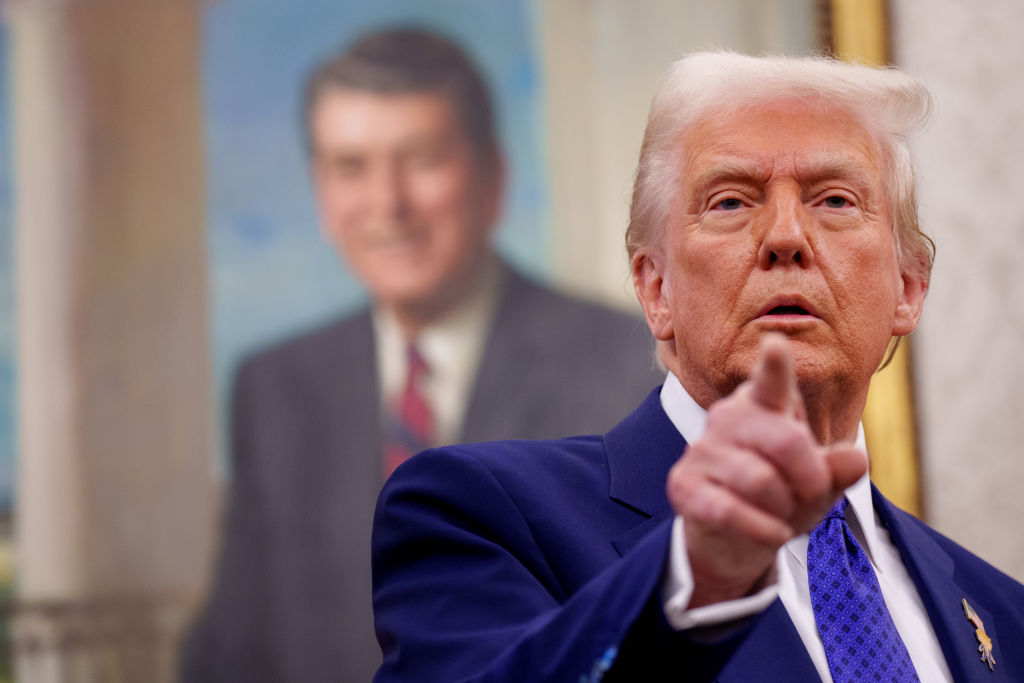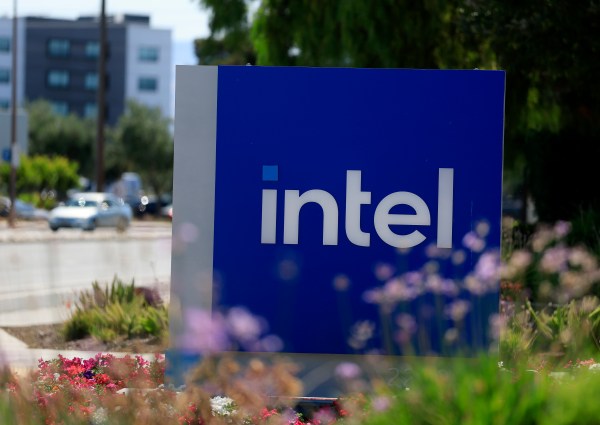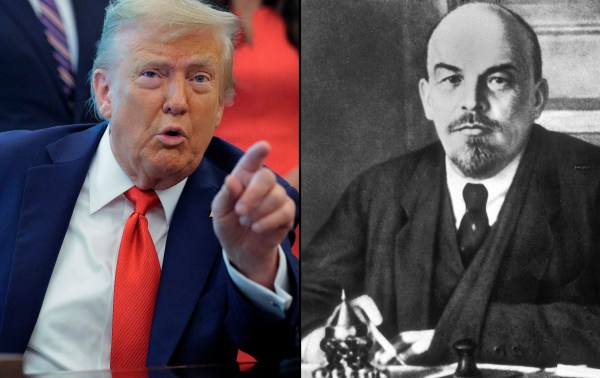A story from the Washington Post has been sitting in my bookmarks folder for three months. I flagged it initially because I knew the instant I read it that it would end up as comic fodder for this newsletter. All I’d have to do is be patient and wait for when the time is right.
The day has arrived.
On November 16, the Post published an account of President-elect Donald Trump meeting resistance from Senate Republicans on some of his Cabinet nominees. “I struggle to find 20 senators who would vote for Matt Gaetz—no way Gaetz gets confirmed,” an unnamed GOP adviser told the paper. “The Senate is not going to give up its advice and consent role for these guys. There are still a lot of senators who take their jobs seriously.”
There are still a lot of senators who take their jobs seriously.
Credit where it’s due, I suppose: Gaetz was not confirmed as attorney general. By tapping a guy accused of having sex at a party with a 17-year-old girl to be America’s top law enforcement officer, Donald Trump discovered that even life forms as supine as congressional Republicans have a limit to how much sleaze they can rationalize. But I wonder if, in hindsight, the president regrets letting Gaetz withdraw from consideration instead of daring the Senate GOP to vote him down.
After all, everything we’ve seen from them since then proves that they do not, in fact, take their jobs very seriously.
Last month, they confirmed dissolute Fox News talking head Pete Hegseth to command the U.S. military. On Wednesday, they confirmed Russia simp Tulsi Gabbard to lead America’s intelligence bureaus. This morning, they confirmed anti-vax crank supremo Robert F. Kennedy Jr. to head the Department of Health and Human Services. (Among those voting yes was Sen. Bill Cassidy, a medical doctor.) Next week, they’ll confirm Kash Patel, a man so unfit to serve that even members of Trump’s first Cabinet wouldn’t work with him, to direct the FBI.
This was all utterly predictable (see), which is why I bookmarked the Post story in November. The idea that “there are still a lot of [Republican] senators who take their jobs seriously” was so preposterous that I knew we’d get a collective belly laugh out of it after the confirmation process played out. Et voila.
Why was it so predictable, though?
Dr. Cassidy isn’t stupid, needless to say. Nor do I think he’s gullible: His statement announcing his support for Gabbard made no pretense of claiming that she’s a good candidate for her new position. What made his capitulation in the confirmation process predictable was fear—and that’s saying something, as Cassidy proved once before that he doesn’t scare easily.
To a degree unmatched in my lifetime, and perhaps much further back than that, the culture of American politics is now a culture of fear. That’s why Trump’s second term feels so unlike everything that’s come before it, at least in recent memory.
Fear, not norms.
Norms, not fear, is the standard reason given by his critics when asked to explain what makes him different from his predecessors. I’m as guilty of it as anyone. Choose any column in my archive at random and you’re apt to find a paragraph (or 20) prattling on about the threat he poses to civic norms.
And he does, of course. But that’s not what makes him different.
Jonah Goldberg’s latest G-File is a fine reality check on that point, demonstrating at length that there’s nothing new under the constitutional sun. As loathsome as some of the president’s attempted power grabs have been so far, Jonah argued, America has seen and survived worse.
Another colleague, Sarah Isgur, offered chapter and verse on that point in her own piece last month. Our country has a long, inglorious history of presidents challenging norms designed to limit the power of the executive branch, she noted. Joe Biden’s envelope-pushing wasn’t less obnoxious than Donald Trump’s because it was justified with a whisper rather than a shout.
There’s no disputing that, with one infamous exception, Trump’s authoritarian excesses pale by comparison to the worst norms violations of prior presidents. Woodrow Wilson jailed his critics under the Sedition Act. Harry Truman tried to seize control of America’s steel mills. Franklin Roosevelt interned thousands of Americans because of their Japanese ancestry, an atrocity recent enough that survivors of the camps were still alive this decade.
Trump hasn’t done any of that (so far!), which makes it tricky to argue that he’s some novel threat to the constitutional order. Days ago, reporters pressed him on the hints being dropped by his deputies about defying a court ruling that doesn’t go his way. “I always abide by the courts, always abide by them,” Trump assured them. Pretty norms-y.
He’s simply not as radical a departure from his predecessors’ worst policy instincts as we’d like to believe. But he is a radical departure in cultivating fear as a tool of leverage, right out in the open. And not just fear of political repercussions either.
In his earliest days as a Republican candidate for president, he half-joked with fans that he’d pay their legal bills if they punched protesters at his rallies. As he moved toward the GOP nomination in 2016, he warned there’d be riots if conservatives tried to block him at the convention. Intimidating others is part narcissism and part pragmatism for him, I suspect: It flatters his ego to know that his fans might be willing to kill for him and it pleases him to have an extra lever most politicians lack to pressure others into giving him what he wants. His amoral willingness and charismatic ability to intimidate is the molten core of his strongman persona.
January 6 is the supreme illustration, the infamous exception I mentioned earlier in which Trump proved that he truly is a unique norms-smasher in the breadth of American history. More than one Republican member of Congress has claimed that fear of rabid Trump supporters harming their families led some of their GOP colleagues to oppose his impeachment and removal after the insurrection.
Encouraging unrest if he doesn’t get his way isn’t the only tool he uses to intimidate opponents, though.
Vindictiveness.
No politician in the primary era has been as aggressive as Trump has in boosting electoral challenges to members of his party who buck him. Until 2016, it would have been regarded as somewhere between a faux pas and downright reckless for a sitting president to weaken a congressional incumbent by calling for his or her ouster in a primary. Trump does it regularly now, sometimes out of petty revenge.
That’s why Bill Cassidy went wobbly on Gabbard, Kennedy, and (soon) Patel, of course. He’s up for reelection next year, has drawn a serious primary challenger, and has two strikes against him already by dint of having voted to convict Trump in 2021. Had he opposed one of the president’s Cabinet nominees, any slim chance of him receiving Trump’s endorsement—and salvaging his career—would have evaporated. Cassidy will spend the rest of his life receiving sporadic death threats from populist Republicans either as a sitting senator or as a private citizen; when you frame the choice before him on Trump’s nominees that way, is it any wonder that he chose the way he did?
There’s another form of intimidation Trump employs to great effect. He’s more willing to use the legal power available to him—both as president and as a litigant—to harass opponents than any predecessor since Richard Nixon, at least.
He spent his entire 2024 campaign babbling about “retribution” against his personal and ideological enemies in government and has moved quickly since Inauguration Day to follow through. He’s filed multiple lawsuits against media outlets—in one case for publishing a poll that saw him losing a state he ended up winning handily—despite slim chances of prevailing. He yanked federal protection details from John Bolton, Mike Pompeo, Mark Milley, and Anthony Fauci, placing them in danger for no better reason than that they criticized him in the past.
If you cross the president, you should expect your career, your finances, or even your life to be imperiled if it’s within his power to facilitate that. And rather than obscure that horrifying fact, Trump seems eager to advertise it: Freeing the thugs who broke into the Capitol on January 6 hoping to hang Mike Pence was his way of showing opponents that there’s no sin he won’t countenance if it’s committed in service to him.
That’s new in American history, at least at the national level, no? Prior presidents have sometimes behaved ruthlessly—but usually behind the scenes, as the nature of democracy incentivized them to present a congenial face to the public. No one likes a bully! Supposedly.
But plenty of Americans do like a bully, it turns out, enough so to have handed the presidency back to him despite the fact that he’s never been more imperious. Never mind his criminal convictions and “retribution” talk: This is a guy who referred repeatedly during the campaign to his opponents as “the enemy from within”—and won anyway.
Liberalism rests on the assumption that if a leader tries to govern by fear, the people will recoil and punish him and his party. Bill Cassidy and other elements of American society, inside and outside Washington, are scrambling to adjust to the fact that that assumption has now been proven wrong. No one is coming to remove the bully from the schoolyard.
They’re scared, and they should be.
Fear is contagious.
On Wednesday, Matt Labash described moral cowardice as having become so infectious under Trump that it amounts to a new pandemic. That’s right, and it’s important: A key reason that politics since November’s election has devolved so quickly into a culture of fear is that fear is catching.
It spread early and fast, like smallpox, among our titans of industry. Why Jeff Bezos and Mark Zuckerberg rushed to spit-shine the president’s shoes isn’t entirely clear: Maybe their political views had earnestly changed over the years, but their haste suggests they feared that the new government would harass their companies or freeze them out of federal contracts if they didn’t show obeisance early. Or, perhaps, that they’d lag even further in influence behind Emperor Elon as he reaps the benefits of Trump’s gratitude.
Whichever it is, though, I think they too understood early that no one was coming to remove the bully and so they had no choice this time but to protect themselves by befriending him. And now that they have, lesser influencers across the culture can only watch and wonder: If the richest, most powerful people in the United States believe that resistance is futile, resistance truly must be futile. If tech gods like Zuck fear Trump enough to kneel before Zod, even the average joe had better start worrying about getting on the president’s bad side.
The brazenness of Trump’s corruption over his first three weeks is another panic accelerant.
Americans already had reason to fret that his second term would be janky about norms—we’re talking about a failed coup-plotter here—but watching him hand out favors to cronies like candy, with the examples getting sleazier by the day, is an early sign that he’s now fully unbound. Apart from his uncharacteristic declaration about obeying the courts, everything he’s done—from choosing goons for his Cabinet to pardoning the most violent J6ers to musing about ethnically cleansing Palestinians and turning Gaza into a resort—has vindicated suspicions that he won’t be restrained by any sense of propriety this time. Various signs so far point to a worst-case scenario.
That’s frightening. Even his promise to follow court rulings strikes me as dubious: Does he mean it, or is he only saying it right now because he expects the Supreme Court to side with him anyway out of fear or favor?
As if all of this weren’t bad enough, digital media is a natural incubator for emotional viruses like fear.
To learn what Woodrow Wilson was up to every day, the average American had to read a newspaper—if they could find one locally and, er, if they could read. To learn what Trump is up to, an American need simply wait a moment. Their phone will inform them in short order, frequently by relaying a message from the president himself. New tariffs, a mass purge of some federal agency, selling out Ukraine: Another reason for anxiety is perpetually seconds away.
But if you’re bored while you’re waiting, you can always hop onto social media and digest the latest hair-raising demagoguery from the second-most powerful man in government, the richest homo sapien in history. Or you might check in with the vice president to find out why the federal government should employ people prone to saying things like “Normalize Indian hate.”
Bad enough that we have a government run by terrible, insane people, much worse that technology has made their insanity and terribleness inescapable.
In fact, J.D. Vance’s tremendously embarrassing decision to go to bat for the racist DOGE staffer is itself a nice illustration of the culture of fear that rules the right and, by extension, American politics. Try as he might to be as ruthless as the worst elements of the Republican base demand their leaders to be, Vance continues to step on the occasional rake: He didn’t want to pardon the J6ers convicted of violent crimes and he is, after all, married to one of those Indians toward whom hate should supposedly be normalized.
Wanting the racist DOGE guy to be rehired isn’t just a matter of him protecting his 2028 presidential prospects, I suspect, it’s an expression of fear. The darkest political fate that can befall a member of a movement created by and for demagogues is to be deemed not “one of us,” and J.D. is already exposed on that point. In an illiberal cult obsessed with sniffing out heretics, even the president’s own running mate has to worry moment to moment about his basic good standing. The fear contagion goes—almost—all the way to the top. Just look at Vance’s predecessor.
But nowhere is it worse than in Congress, as Secretaries Hegseth, Gabbard, and Kennedy might tell us. And so I close with an offer to Jonah Goldberg, who wrote in yesterday’s G-File, “I can think of scenarios where even many Republicans would join Democrats in an impeachment effort.” Uh, which scenarios are those, boss? And how many years’ worth of my salary are you willing to wager with me on each?







Please note that we at The Dispatch hold ourselves, our work, and our commenters to a higher standard than other places on the internet. We welcome comments that foster genuine debate or discussion—including comments critical of us or our work—but responses that include ad hominem attacks on fellow Dispatch members or are intended to stoke fear and anger may be moderated.
With your membership, you only have the ability to comment on The Morning Dispatch articles. Consider upgrading to join the conversation everywhere.